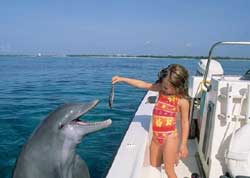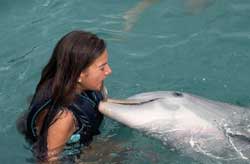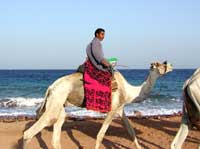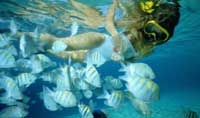|
Nuweiba
 Nuweiba, which means "bubbling springs" in Arabic, is a 7-km
long town stretched along the Aqaba coast of the Sinai Red Sea
about 87 km from Dahab. Developed from a barren isolated place
with no infrastructure into a promising and attractive tourist
destination, Nuweiba has just recently been discovered by
tourist investors who have established hotels along the
coastline south and north of Nuweiba, connecting it with Taba in
the north and Dahab in the south. Nuweiba, which means "bubbling springs" in Arabic, is a 7-km
long town stretched along the Aqaba coast of the Sinai Red Sea
about 87 km from Dahab. Developed from a barren isolated place
with no infrastructure into a promising and attractive tourist
destination, Nuweiba has just recently been discovered by
tourist investors who have established hotels along the
coastline south and north of Nuweiba, connecting it with Taba in
the north and Dahab in the south.
Due to the problems in Israel, tourism to the area is now down.
This is not because of any danger within the area. Rather it is
due to the fact that Israelis once made up a significant segment
of the tourist population to the area and are no longer
traveling as much because of their own internal conflict. This
really ends up being a bonanza for other travelers to the area
who are seeking a laid back, non-congested beach or scuba diving
vacation. Vacation specials abound, and the local tourism
industry is working hard to promote the area to new markets.
 Nuweiba can be divided into three main sections and runs for
some ways along the beach. The three areas consist of the port
of Noweiba which has become fairly busy these days, Noweiba City
which has a bazaar and tourist shops, and Tarabin which is the
real party area of the area. Nuweiba can be divided into three main sections and runs for
some ways along the beach. The three areas consist of the port
of Noweiba which has become fairly busy these days, Noweiba City
which has a bazaar and tourist shops, and Tarabin which is the
real party area of the area.
Nuweiba Tarabin, the northern part, consists of a thick grove of
palms, a shallow bay and the ruins of a Turkish fort. The well
inside the ruins has served the Bedouins as a fresh water source
for centuries. In the early 80’s, the process of settling
started, when families of the Tarabin tribe who occupy the area
north of Nuweiba, permanently moved to live in their summer
location. At this time the Bedouins set up the first simple
accommodations made of scrap wood and metal, the only material
available. With an increase in tourism and an improving
infrastructure, soon many campsites and small hotels sprouted
like mushrooms along the bay.
Tarabin is known for its lively oriental atmosphere. Restaurant
by restaurant and bazaar next to bazaar gives you the impression
of a colorful oriental market place. Along the beach you find
lively outdoor restaurants in Bedouin style furnished with
carpets and cushions that invite you to lay back and relax and
let the time pass by.
 The town itself is built around the former Moshav Neviot, which
was established during the Israeli occupation in 1971. Its
significance lies in marking the tribal boundary between the
Tarabin tribe in the north and the Muzeina tribe in the south. The town itself is built around the former Moshav Neviot, which
was established during the Israeli occupation in 1971. Its
significance lies in marking the tribal boundary between the
Tarabin tribe in the north and the Muzeina tribe in the south.
The Dunes are the extension and connection between Nuweiba Town
and Nuweiba Muzeina (Nuweiba Port). Along the shore exist a
conglomerate of many camps and small-scale hotels on the
beautiful sandy beaches with spectacular coral reefs just in
front of them. The Dunes are divided between "Duna" and "small
Duna". Most of the campsites and hotels are built in the
southern "small Duna", while "Duna" remains a romantic virgin
place with simple accommodations of thatched beach bungalows and
some small restaurants with brilliant views.
Nuweiba Port, also known as Nuweiba Muzeina, is the industrial
area. With the construction of the port in 1985 trade business
between Egypt and the Arab countries on the other side of the
Gulf of Aqaba increased. A highway was built through the
mountains connecting mainland Egypt with the Sinai Peninsula to
accommodate this trade.
 Egyptians from all over the country came to live in Nuweiba as
work flourished. Homes and schools were built, shops and
business centers opened and the first hotels were established. Egyptians from all over the country came to live in Nuweiba as
work flourished. Homes and schools were built, shops and
business centers opened and the first hotels were established.
Originally Nuweiba port was the summer location for the Muzeina
tribe. It was a sparsely inhabited oasis, which came only into
life in the late summer, when the Muzeina flocked to the palm
groves to pick dates. The thriving trade encouraged the Muzeina
clan to settle. Today, they are running their own businesses by
renting out their places as shops or other facilities to the
Egyptian newcomers.
Nuweiba is famous for its beautiful beaches covered by Palm
trees. All along the Sinai cost you will find good scuba diving,
and Noweiba is no exception. Besides the diving, you will also
find camel and jeep adventurers. The Colored Canyon is nearby,
and a little beyond is the oasis of Ain el-Furtaga. Noweiba also
has a daily ferry service to the Jordanian port of Aqaba. |